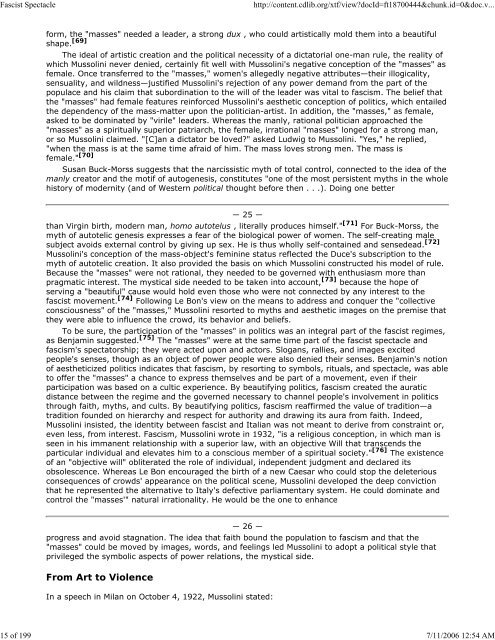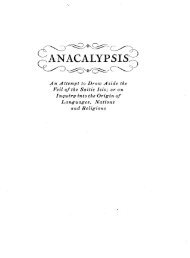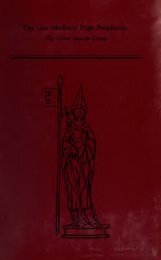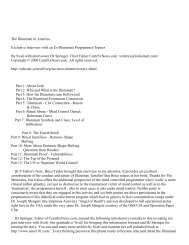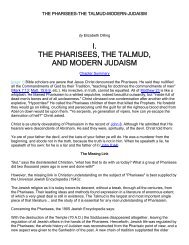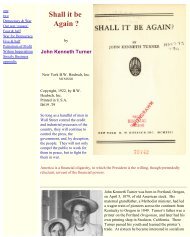You also want an ePaper? Increase the reach of your titles
YUMPU automatically turns print PDFs into web optimized ePapers that Google loves.
<strong>Fascist</strong> <strong>Spectacle</strong> http://content.cdlib.org/xtf/view?docId=ft18700444&chunk.id=0&doc.v...<br />
form, the "masses" needed a leader, a strong dux , who could artistically mold them into a beautiful<br />
shape. [69]<br />
The ideal of artistic creation and the political necessity of a dictatorial one-man rule, the reality of<br />
which Mussolini never denied, certainly fit well with Mussolini's negative conception of the "masses" as<br />
female. Once transferred to the "masses," women's allegedly negative attributes—their illogicality,<br />
sensuality, and wildness—justified Mussolini's rejection of any power demand from the part of the<br />
populace and his claim that subordination to the will of the leader was vital to fascism. The belief that<br />
the "masses" had female features reinforced Mussolini's aesthetic conception of politics, which entailed<br />
the dependency of the mass-matter upon the politician-artist. In addition, the "masses," as female,<br />
asked to be dominated by "virile" leaders. Whereas the manly, rational politician approached the<br />
"masses" as a spiritually superior patriarch, the female, irrational "masses" longed for a strong man,<br />
or so Mussolini claimed. "[C]an a dictator be loved?" asked Ludwig to Mussolini. "Yes," he replied,<br />
"when the mass is at the same time afraid of him. The mass loves strong men. The mass is<br />
female." [70]<br />
Susan Buck-Morss suggests that the narcissistic myth of total control, connected to the idea of the<br />
manly creator and the motif of autogenesis, constitutes "one of the most persistent myths in the whole<br />
history of modernity (and of Western political thought before then . . .). Doing one better<br />
― 25 ―<br />
than Virgin birth, modern man, homo autotelus , literally produces himself." [71] For Buck-Morss, the<br />
myth of autotelic genesis expresses a fear of the biological power of women. The self-creating male<br />
subject avoids external control by giving up sex. He is thus wholly self-contained and sensedead. [72]<br />
Mussolini's conception of the mass-object's feminine status reflected the Duce's subscription to the<br />
myth of autotelic creation. It also provided the basis on which Mussolini constructed his model of rule.<br />
Because the "masses" were not rational, they needed to be governed with enthusiasm more than<br />
pragmatic interest. The mystical side needed to be taken into account, [73] because the hope of<br />
serving a "beautiful" cause would hold even those who were not connected by any interest to the<br />
fascist movement. [74] Following Le Bon's view on the means to address and conquer the "collective<br />
consciousness" of the "masses," Mussolini resorted to myths and aesthetic images on the premise that<br />
they were able to influence the crowd, its behavior and beliefs.<br />
To be sure, the participation of the "masses" in politics was an integral part of the fascist regimes,<br />
as Benjamin suggested. [75] The "masses" were at the same time part of the fascist spectacle and<br />
fascism's spectatorship; they were acted upon and actors. Slogans, rallies, and images excited<br />
people's senses, though as an object of power people were also denied their senses. Benjamin's notion<br />
of aestheticized politics indicates that fascism, by resorting to symbols, rituals, and spectacle, was able<br />
to offer the "masses" a chance to express themselves and be part of a movement, even if their<br />
participation was based on a cultic experience. By beautifying politics, fascism created the auratic<br />
distance between the regime and the governed necessary to channel people's involvement in politics<br />
through faith, myths, and cults. By beautifying politics, fascism reaffirmed the value of tradition—a<br />
tradition founded on hierarchy and respect for authority and drawing its aura from faith. Indeed,<br />
Mussolini insisted, the identity between fascist and Italian was not meant to derive from constraint or,<br />
even less, from interest. Fascism, Mussolini wrote in 1932, "is a religious conception, in which man is<br />
seen in his immanent relationship with a superior law, with an objective Will that transcends the<br />
particular individual and elevates him to a conscious member of a spiritual society." [76] The existence<br />
of an "objective will" obliterated the role of individual, independent judgment and declared its<br />
obsolescence. Whereas Le Bon encouraged the birth of a new Caesar who could stop the deleterious<br />
consequences of crowds' appearance on the political scene, Mussolini developed the deep conviction<br />
that he represented the alternative to Italy's defective parliamentary system. He could dominate and<br />
control the "masses'" natural irrationality. He would be the one to enhance<br />
― 26 ―<br />
progress and avoid stagnation. The idea that faith bound the population to fascism and that the<br />
"masses" could be moved by images, words, and feelings led Mussolini to adopt a political style that<br />
privileged the symbolic aspects of power relations, the mystical side.<br />
From Art to Violence<br />
In a speech in Milan on October 4, 1922, Mussolini stated:<br />
15 of 199 7/11/2006 12:54 AM


